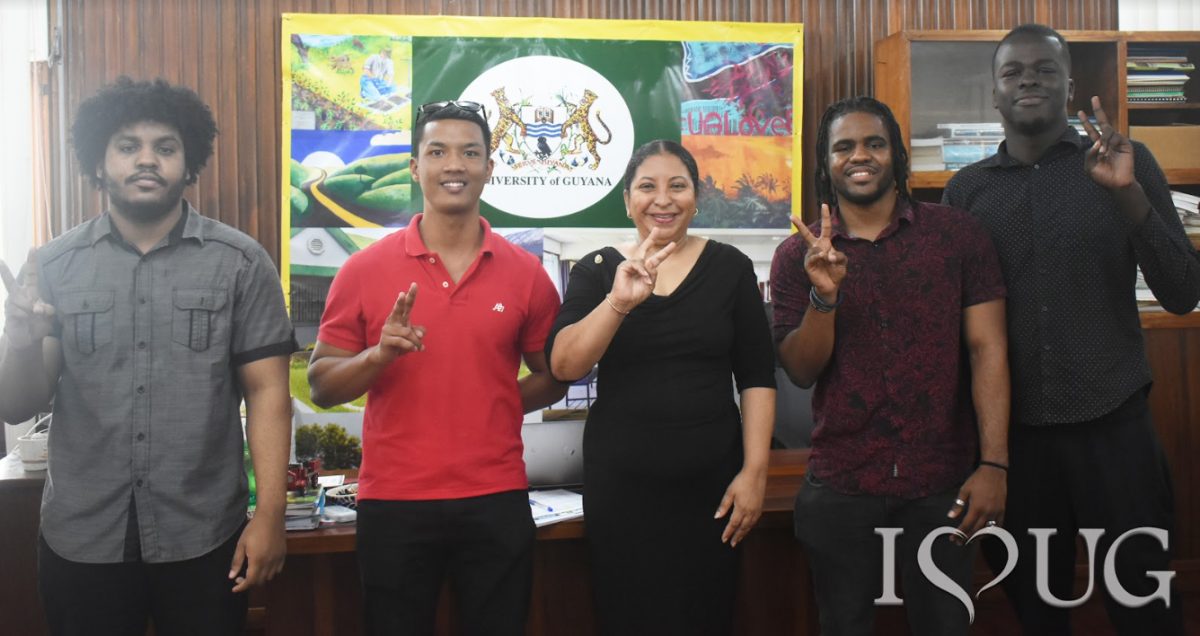A team from Guyana – comprised of UG students and staff – has won the international Webby Award from a field of 150 contestants with a proposal to combat deforestation through the integration of Artificial Intelligence (AI) with drones.
The winning team members are Shomari Williams, his brother Malik Williams, Andrew Garnett and Jung Leung. They came away with the top prize of US$50,000.
According to a release yesterday from the University of Guyana, the Guyanese team presented a novel proposal that integrates AI, the use of drones and the internet to combat deforestation.
To tackle deforestation, the team is proposing to create a “comprehensive monitoring system that streams audio to dispatch drones to see what is happening in the forest.”
According to a Webby awards article, “Team FramePerfect wants to attach AI-powered listening devices into trees throughout the forest and inform drone devices when logging activity is taking place. They have a vision of using the drones to inform rangers of when illegal logging takes place.”
The 5G For Change International Hackathon, which was hosted by telecoms company Verizon in New York last week, saw 150 international teams participating in the competition.
FramePerfect, the Guyanese quartet, came together while attending the University of Guyana over their shared love for computer science. The release said that they founded Unity GY, a non-profit organisation that “leverages technology to solve problems and to narrow the education gap in Guyana.”
It was the same team that developed the UG Cares application, which is used to match donors with persons in need from inside or outside of Guyana.
FramePerfect was invited to compete for the award following a similar win in the recently launched GTT hackathon. The release said that their journey through the competition was far from perfect since they had to raise funds to attend and they lived and worked on a tight budget. They lived together in a single hotel room in Manhattan, New York for the duration of the two-week competition.
According to the event organisers, the Hackathon challenged teams to tackle an important issue and solve it by using 5G and the internet. Out of 150 submissions, the UG release said that only five teams were selected to pitch their ideas before a judging panel of industry leaders—from Verizon, MIT Solve, the Black Ambition Opportunity Fund and Stagewell Global—at Verizon’s headquarters in New York City. Shomari Williams is the Data and AV Officer in the Office of the Vice-Chancellor (PACE Unit). His brother, Malik Williams, is an ICT engineer at UG. Leung is about to graduate from the University of Guyana and is a part-time software developer at the University and Garnett is looking to pursue his Master’s in data science /Artificial Intelligence.
In an interview with UG’s Public Relations Department, Shomari said: “We are elated that we won. We’re happy because we got to showcase and defend our idea and, in the process of doing that, brought attention to The University of Guyana and Guyana as a whole.”
Expressing deep appreciation to all those who supported the team’s participation in the event, Shomari said: “Firstly, I have to acknowledge that my team would not be able to participate in this competition if it wasn’t for the support of the University of Guyana’s Faculty of Natural Sciences, the Philanthropy, Alumni and Civic Engagement (PACE) office and Tactical Online Service (TOS) departments at UG and GTT.”
The Vice-Chancellor of the University of Guyana, Professor Paloma Mohamed has expressed the University’s delight at the team’s success. She said, “This is what UG is supposed to be about. Success for our students and staff in any arena. We are getting there, and this is one of those things that is testimony to this focus of student-citizen success that we have. My office supported them because we thought they deserved the exposure as young people. They still had to do their UG work while travelling. Sometimes speaking to Shomari, who works in my office late at night, I could hear the others in the background, definitely cramped in a single room but intellectually expansive, awake and firing on all cylinders. A special, special moment for all the young people of this country and region! We are just happy and thank these young men and all those who also helped to support them and nurture them.”






